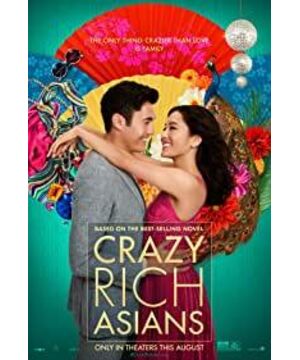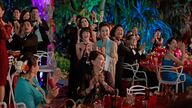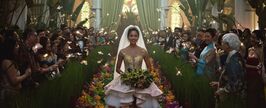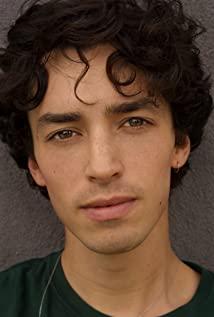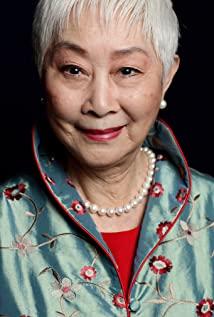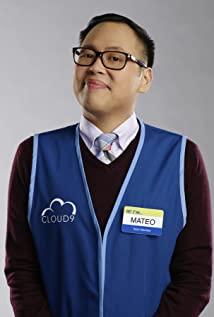This movie gave me complex feelings in many details, although the plot itself has no part that can be digged deep-the original book is originally a shallow story. It can be seen that the director has put a lot of thought into selecting and appointing people.
In this all-Asian English film, the sense of class is first reflected in the accent. The director is very careful: a super rich person who represents the old money, and a British accent. You know, the old lady of this family, after the stars Gongyue appeared like a queen mother, she speaks a graceful Beijing accent—the afterglow of another imperial accent. I haven't read the original work yet, and I don't know if this is an intentional arrangement by the director. But the accent is too rich, just like the Malaysian English accent that actor Michelle Yeoh-and Mrs. Yang as she plays-almost perfectly cover up; the male protagonist's pure London accent corresponds to his growing up background, and the heroine's mother Trying to hide the Singaporean accent (because she plays a mainland immigrant). As the true background of this play, there are only a handful of places where Singlish appears in the play: most of the conversations at the dinner table are the little rich mistress of the Gao family (representing the secular symbol of Po Island-auntie), which is basically to stimulate Humor. The Singlish accent is indeed unique. It is extremely inappropriate to say something. With the background of the orthodox English accent (another inappropriate sentence), it appears cramped because it is too commonplace, so it can only be used in a joke. Singlish itself is a digestion of orthodox English, both in terms of accent and grammar. The strange English accents of the colonial people, such as Indian English, Filipino English, and even Hong Kong-style English, were often laughed at like lower creatures. But in my opinion, only Singlish, because of extreme ethnic integration and cultural collision, has evolved its own vocabulary, grammar, and pronunciation in a different space. This is first of all a grassroots dialect, so the super-rich in the movie also took the lead to abandon it.
Mrs. Yang and her husband met in Cambridge. They are not inferior to the real British upper class in terms of education, intelligence, wealth, and accent. This is almost the highest pursuit and symbol of the Chinese in the previous generations of British colonies. Of course, shoulder-to-shoulder is definitely not enough, transcendence can produce a transfer of power. After being humiliated by the waiter of the private hotel, Mrs. Yang made a phone call and asked the old British Sir to go downstairs to announce the "Birth of the New Lord", and clarified the primary position of wealth in the rise of status. The theme of the film couldn't be clearer: there are countless gaps between the proletarian and the property owner, and even the manipulator of the relationship of production. Whether it is an arrogant hotel staff or an intellectual and beautiful university professor, regardless of race or morality, they are all inferior in the eyes of the old money. This is what Mrs. Yang means when she coldly says her own.
In the movie, Mrs. Yang confronts the heroine Rachel and does not hesitate to deny the United States and Americans, thinking that American values advocate the pursuit of personal ideals and ignore family interests, which is incompatible with a family like her. In fact, what is behind this denial? Is it to deny an American by adhering to the British upper-class status in economics and accent, or denying the offspring of poor mainland immigrants as a wealthy Chinese in Southeast Asia? Or both? The second denial is not obvious, maybe the director deliberately did it-in order not to trigger the chain of contempt within the Chinese in the world. Or because, the second part of the original series is "Chinese Rich Girlfriend". In the world of manipulators, the stories of old money and upstarts are always being staged in turns, regardless of race or character. The'tradition' that Mrs. Yang is proud of is not only the Chinese tradition, but the natural posture of the old money when guarding the order.
The title is "Crazy Rich Asians", and Asians don't need to call themselves Asians, only when we face others, we need to refer to ourselves. So, of course, this film was made for non-Asian people-more popularly, it was mainly made for European and American whites. White people can't distinguish the broad-spectrum differences within Asians, so they give us a collective name. Well, the original author Kevin Kwan is a Singaporean Chinese, and most of the characters in this story are also all kinds of Chinese. Didn’t he know that Asians not only refer to Chinese, but also to numerous Filipinos, Indonesians, and Indians? With the Japanese? In other words, why did he refer to such a Chinese family as Asian instead of Chinese?
In addition to a considerable international population, Singapore has 70% Chinese, 20% Malays and 10% Indians. This is the only Chinese-dominated country surrounded by Muslims in the region, and it is always thinking about its own position. In view of the dual orientation of Chinese in terms of nationality and ethnicity, in order not to cause sensitive ethnic and international disputes, the government has emphasized “One People, One Nation, One Singapore” internally for many years, trying to imitate the United States, the most successful immigration country. , To shape the conscious identity of'Singaporeans', even at the expense of mining local culture and creating local symbols. Externally, Singapore's ambition is to be the spokesperson for Asia. The National University is'Asia's Leading University'. The goal of any new research institution is to'lead Asia' first. The institutions of the Lee Kuan Yew School of Public Policy include the'International Asian Research Institute'... Singapore is indeed better than any other Asian city. Internationalization is a melting pot of Asians. In such a place where race and culture are everywhere mixed (not to mention the depth of these transplanted cultures), English is a hanging beam and an anchor. English education has been implemented for many years, even if it does not completely cut off the connection between the race and the home country’s culture, at least it is to keep a safe distance by blocking it, and a layer of “advanced language and culture” has been painted on everyone. . Internally and externally, Chineseness has been deliberately downplayed-unless there is a need to emphasize diversity. Instead, there is a consciously shaped diffuse image of Asia. This is a concept that has not yet been completely finalized. It is keenly aware that oneself is different from the viewer (white) because of the lack of accurate description and classification of oneself (or itself It's a hodgepodge), and unwilling to appear confused, but grabbed a big umbrella. After all, no one wants to be a drifter. Between the mother country's descent culture and the strong English culture, either choose one or break out and say that you are the unique third.
In Nanyang, every Chinese who speaks English has his identity reset. Don't forget, today's Mandarin was only established in the last century. As far as language is concerned, dialects, English, and the official language of the country where they are located are the first to be divided into three parts. In terms of descent, there are a large number of Peranakans (peranakan) resulting from the union with the Malays. Religiously, there is even the Chinese Christian tradition in the Southeast Asian region, adding another touch to this complex picture. So what is Chineseness? This is something that generations will only consider. For the second generation and the third generation, the foundation of identity is first of all family. Under the general environment, it is often inconvenient and unwilling to emphasize Chinese identity, and it can only be called Asian identity in general.
So there is no Chinatown in the film and there is no need for it. Assuming the show is called Crazy Rich Indians, Little India will never appear in the movie. These scenic spots with strong ethnic customs and a large number of people in the home country are just because they are too clear and too ethnic, and appear to be contrary to the vague face of'Asianization'. In the selection of appearances, the row of well-renovated, exquisite and elegant shophouses on the roadside of Bukit Basoh is one of the representative symbols of'Asianization' in recent years. Most of these shophouses were built at the beginning of the last century with mixed architectural styles. They are often Malay gatehouses with electric fans, Peranakan ceramic tile decorations, and Western-style columns and Chinese plaques. Due to the proximity to the city center, many houses have been bought as bars and restaurants, and they are very beautiful after refurbishment. So what exactly is Asianness? Judging from the metaphor of the shophouse, it came from the shop, has become a chimera, and flexibly integrates into the local and exotic features.
The conflict between Mrs. Yang and Rachel took place in a European-style mansion, where Mrs. Yang’s home ground. But at the end, the director deliberately arranged the contest between the two in the former residence of Zhang Bishi in Penang. This is the representative building of the early Nanyang Chinese rich, the same style is mixed, but the exquisite atmosphere and more traditional Chinese elements. Mrs. Yang walked through the plaque with the words'Ju Ren Yuyi' (I wonder if Michelle Yeoh, who was born in Ipoh, could understand the words in Mencius), came to the mahjong table set by Rachel in the atrium-how wonderful it is In the analogy of Mahjong, there are no adults at the mahjong table. Everyone enjoys equal luck and fights with wisdom and courage. In the end, the family affairs of the Chinese are still negotiated, contested, and reconciled in the same way as the Chinese. This should be the whole film, and it is rare that only Asian is emphasized, and the part of Rich is not emphasized.
View more about Crazy Rich Asians reviews


